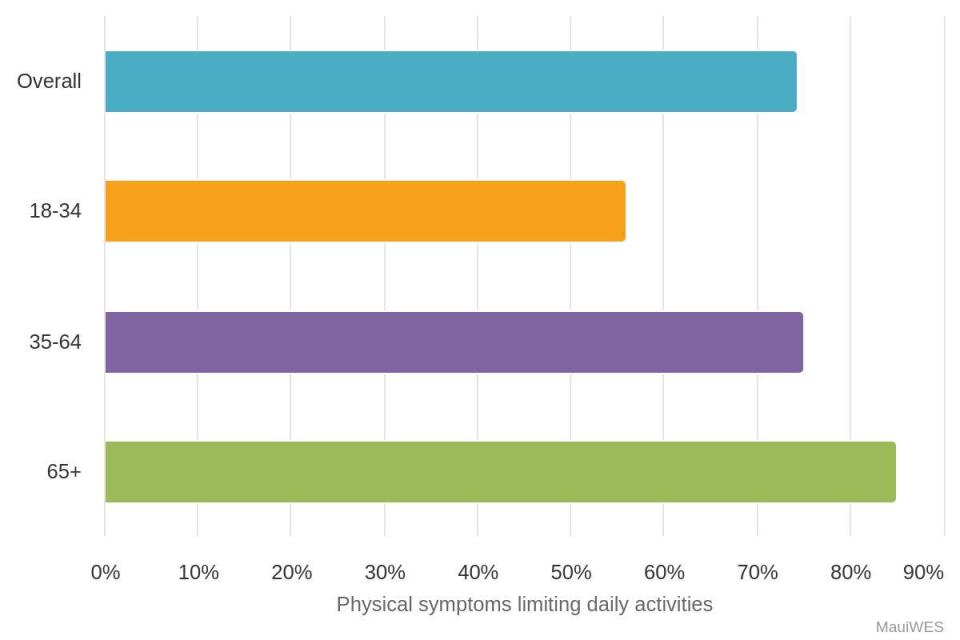Maui fires left victims food insecure and with health issues, survey finds
It's been nine months since deadly wildfires scorched across the Hawaiian island of Maui, killing dozens of people and leaving the historic town of Lahaina in ashes. And according to a new study, people are still feeling the effects of those fires — with many food insecure and at risk for serious health issues.
The public health report, conducted by researchers at the University of Hawai'i Economic Research Organization and the John A. Burns School of Medicine, looks at the lingering impacts of the August 2023 fires that killed 101 people. Researchers will monitor and analyze these impacts for at least a decade, but already found significant issues in its first sampling of fire victims, which was conducted in February.
Researchers surveyed 679 people, two-thirds of whom lived in Lahaina during the fires. Nearly half of those surveyed reported seeing a decline in their health compared with a year ago, which researchers said "could deteriorate further if difficulties in accessing care and lack of health insurance are not addressed." Among those issues are complications with residents' cardiovascular health.
"Exposure to smoke, ash, and debris is strongly associated with worse physical health outcomes and reported symptoms," the report says. "Approximately 74% of participants face a heightened risk of cardiovascular diseases due to elevated or prehypertension levels. Kidney function may be compromised in 8-20% of participants, and up to 60% may suffer poor respiratory health."
More older adults seem to be affected physically, with 85% of those ages 65 and older reporting physical symptoms have limited their daily activities, including moderate and vigorous exercise, carrying groceries, climbing one flight of stairs, bending, walking or bathing.

Researchers also found a "notable increase in depression," among other mental health issues. Roughly 30% of participants reported feeling moderate or severe anxiety and a slightly larger percentage reported feelings of low self-esteem. Less than 4.5% said they suffered suicidal thoughts following the fires. These numbers were "significantly higher than state and local averages," researchers said, noting that the mental health impact seemed to extend beyond those who were physically exposed to smoke, ash and debris.
Having enough to eat is also a major concern, with nearly half of households in February's survey experiencing food insecurity, a rate researchers said is higher than those previously observed both locally and across the state. This impact is at least somewhat tied to employment issues also experienced since the fires. Nearly half of surveyed victims lost their jobs because of the fires, 20% of whom are still unemployed. Three-quarters of those surveyed make less money than they did before the fires.
"By studying impacts now, we're in a position to prevent short- and long-term conditions such as lung disease and cancer, which our population is already more susceptible to," researcher Alika Maunakea said.
Maunakea said many of those who reported being more exposed to the fires seem to have more symptoms, and that many of those who participated in the study haven't seen a doctor. Many say they haven't received care because their clinics were destroyed in the fires or because other essentials – like food and housing – took priority.
"There might be some problems that might manifest in the future," he said, according to the Associated Press. "Please see your doctor. Just pay more attention to your health because of this.'
As the study continues, researchers say they hope to enroll 2,000 people to participate.
Nikima Glatt, who lived in Lahaina when the fires swept through, told CBS affiliate Hawaii News Now that she worked in the burn zone during the re-entry period.
"I was a runner. I was a skater. I used to exercise a lot," she said. "And now it's difficult for me to do normal things that I used to."
Cuban Spycraft | Sunday on 60 Minutes
Woman attacked by bull on Mexico beach after ignoring warnings

